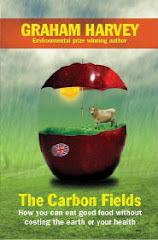
I'm happy to announce that I am NOT alone in my beliefs that a return to grass based farming is benificial to all...scientists agree with me.
According to a study funded by the Economic and Social Research Council (ESRC) "Cattle and sheep grazed on natural grasslands help maintain biodiversity and produce tastier, healthier meat".
If that wasn't reason enough to eat grass fed then read on. The report also says that "pasture-based farming is good for the environment, the consumer and the producer"
If you want to read more about the benifits of switching to grass fed you might like to read my latest book The Carbon Fields. Available in bookshops throughout the UK or you can buy it online and save 20% of the RRP.


8 comments:
Graham, I enjoyed reading your book. It would be good to meet sometime to discuss how your ideas might be implemented in a local context. Tim Stokes, Sustainability & Economy Manager Exmoor NPA 01398 322235
Do you think the onslaught of wind turbines up and down the country would make a great storyline for the archers. We are not alone in fighting these applications (www.frawt.org.uk) and it would give the programme a chance to put both sides of the debate
Thank you for your book. It's very heartening.
Is there any equivalent commany or organisation in the UK doing what Carbon Farmers of America is doing?
Or any plans?
Jo
Graham, as regards increasing soil carbon, are you aware of the use of biochar as both a soil amendment and a food additive for animal feeds?
If you would like to discuss this please contact me at jerome(at)worldbiochar.com
Many congratulations for Carbon Fields - I very much hope that you have set off a much needed debate in the industry and the relevant agencies.
Do you know if any Agricultural Colleges are involved in pasturage research. Who would you suggest to approach if a College wished to set up trials?
Regards, Roger Paterson
Congratulations Graham, I hope Carbon Fields informs and promotes a wider interest about pasture farming.
Do you know if any agricultural college is involved in grassland studies or research. Who would you recommend to contact if a college wished to explore this area?
Very impressive book "Carbon Fields", but, how do we grow vegetables and grain without destroying the good work? Or is it OK to have occasional cultivation?
And which systems would you recommend for growing vegetables.
Simon.
It's a fascinating book. Clearly it makes more sense to produce beef, lamb or cheese from grass than grain. But a molecule of methane is a worse GHG than a molecule of CO2. Pasture may be be less damaging than industrial agriculture but is it good enough? Does organic matter taken up by grazing outweight the millions of tonnes/yr of methane?
I think we may need to assess options such as using more non-ruminants (which also convert food more efficiently) and agroforestry. See e.g. Martin Crawford's work at the Agroforestry Research Trust, Devon.
Farmers of Forty Centuries describes a agricultural system which included few if any ruminants. Japan / Korea / China appear to have fed more people/ha. than this model can feed - and it managed that before a century of (conventional) plant breeding.
D
Post a Comment